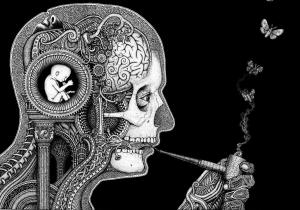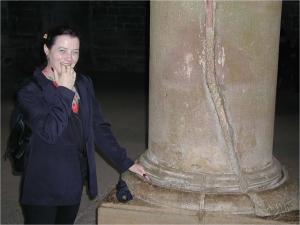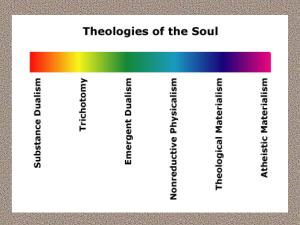Nonreductive Physicalism. Soul 6

We introduced Nonreductive Physicalism in previous Patheos posts such as Materialisms Soul 4 and Emergent Dualism Soul 5. The widely influential scholar who has developed nonreductive physicalism is Senior Professor of Christian Philosophy at Fuller Seminary, Nancey Murphy.
The nonreductive physicalist accepts the idea of emergence in emergent dualism. But this position rejects assigning independent substantial status for the emergent soul or mind.
Nonreductive physicalism affirms that (a) it is unnecessary to postulate a second, metaphysical entity, such as a soul or spirit, to account for human capacities, and that (b ) human behavior cannot be explained exhaustively with recourse to genetics or neuroscience. The metaphysical status of the soul here is closer to what the materialists affirm. No soul exists, though we certainly experience our minds. Nonreductive physicalists reject substance dualism in favor of materialism, yet the human mind is an emergent that is not reducible to its physical base.

If you’re having a hard time right now distinguishing nonreductive physicalism from emergent dualism and materialism, try this. On the one hand, the nonreductive physicalist differs from the emergent dualist because, though he or she or they believes we have a mind or soul, it is of the same type of reality as our physical body. The dualism of two separate substances is rejected, so that the material or bodily realm is the only one deserving to be called a substance.
Looking the other direction, does this reduce the nonreductive physicalist to materialism? No. The nonreductive physicalist differs from the materialist because, though he or she or they believes the mind or soul is of the same metaphysical type as the body, still it experiences enough independence that it cannot be reduced to just a manifestation of the body.
Did you get that? If so, congratulations. If not, don’t worry. Just keep going.
Let’s try it again. According to the nonreductive physicalist, the mind is a coordinated product of brain activity. But it is more than mere brain activity. The picture drawn by the nonreductive physicalist looks like this: if there is no separate soul substance, then human higher capacities must be explained largely–though not exhaustively–as physical brain functions. But their full explanation requires attention to human social relations, to cultural factors, and most importantly, to God’s action in our lives.
Like emergent dualists, Christian nonreductive physicalists affirm resurrection of the body. They emphasize that immortality does not come from the immortal quality of a soul substance. Rather, it comes solely as an act of God whereby we will be raised. Some sort of physical identity as well as identity of internal consciousness must be carried into the resurrected life if it is we, and not someone else, who enjoys resurrection.
Nancey Murphy’s Nonreductive Physicalism

The masterful potter molding the biblical clay into the conceptual shape of nonreductive physicalism is Nancey Murphy, as I said above. Nancey Murphy Startling to her disciples is her zeal at constructing a theological anthropology based on Genesis 2:7 which eschews a substantial soul.
“We are our bodies—there is no additional metaphysical element such as a mind or soul or spirit. But…this physicalist position need not deny that we are intelligent, moral, and spiritual. We are, at our best, complex physical organisms, imbued with the legacy of thousands of years of culture, and, most importantly, blown by the Breath of God’s Spirit: we are Spirited bodies” (Murphy 2006, ix).
Murphy need not collapse God into the physical domain. Only humans.
“The nonreductive physicalist says instead that if there is no soul then these higher human capacities must be explained in a different manner. In part, they are explainable as brain functions, but their full explanation creatures attention to human social relations, to cultural factors, and, most importantly, to our relationship with God” (Murphy 2006, 70).
When it comes to your and my resurrection, it will come as a decisive action by God in which we are raised into spirited bodies. Isn’t’ that what St. Paul says?
“It is sown a physical body, it is raised a spiritual body. If there is a physical body, there is also a spiritual body [soma pneumatikon] (1 Corinthians 15:44).
The key term here is soma pneumatikon or spiritualized body. Both Zimmerman and Murphy look forward to the resurrection of the spiritualized body.

Conclusion
What most of the positions on this spectrum mentioned thus far have in common is the close connection between the soul and the mind. This means that the presence of soul applies to a large but limited segment of the human population, namely, those persons after fetal brain development in infancy and prior to brain deterioration in old age. What is missing, from my point of view, is the idea that the soul is more comprehensive than the mind. It is not unusual to believe that the human soul belongs to the essence of personhood, a personhood that is not reducible to active thinking.
Regardless, when we think about eternal life with God, we cannot dodge one incontrovertible fact: it is up to God and God alone to determine our resurrection. Christian theologians who flirt with either emergent dualism of nonreductive physicalism seem to be clear on this matter. Their task becomes one of constructing a coherent concept of the soma pneumatikon, spiritualized body.
Patheos ST 4136 Soul 6 Non-Reductive Physicalism
Patheos ST 4131 Soul 1 Theologies of the Soul
Patheos ST 4132 Soul 2 Substance Dualism
Patheos ST 4133 Soul 3 Trichotomy
Patheos ST 4134 Soul 4 Materialisms
Patheos ST 4135 Soul 5 Emergent Dualism
Patheos ST 4136 Soul 6 Non-Reductive Physicalism
Patheos ST 4137 Soul 7 Bodily Resurrection
Patheos ST 4138 The Soul of Benedict XVI
Patheos ST 4139 Blessed Mother Olga of Alaska knitted mittens
Patheos ST 4140 Supporting Husbands in Theology
▓

Ted Peters’ Teddy Bear.Ted Peters (Ph.D., University of Chicago) is a public theologian directing traffic at the intersection of science, religion, and ethics. Peters is an emeritus professor at the Graduate Theological Union, where he co-edits the journal, Theology and Science, on behalf of the Center for Theology and the Natural Sciences, in Berkeley, California, USA. He recently co-edited Astrobiology: Science, Ethics, and Public Policy (Scrivener 2021) as well as Astrotheology: Science and Theology Meet Extraterrestrial Intelligence (Cascade 2018). He also co-edited Religious Transhumanism and Its Critics (Lexington 2022) and The CRISPR Revolution in Science, Ethics, and Religion (Praeger 2023). Peters is author of Playing God: Genetic Determinism and Human Freedom (Routledge, 2nd ed, 2002) and The Stem Cell Debate (Fortress 2007). See his blogsite [https://www.patheos.com/blogs/publictheology/] and his website [TedsTimelyTake.com].
▓
Works Cited
Murphy, Nancey. Bodies and Souls, or Spirited Bodies? Cambridge UK: Cambridge University Press, 2006.














